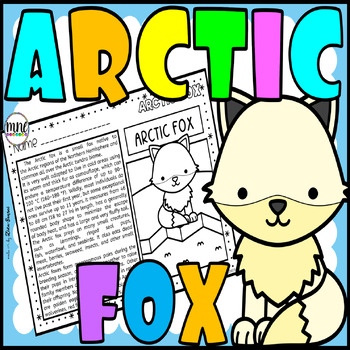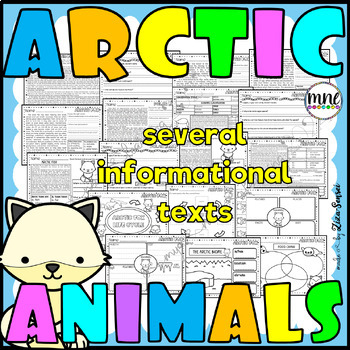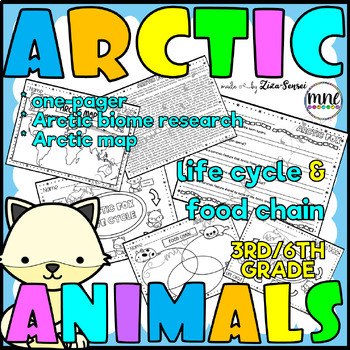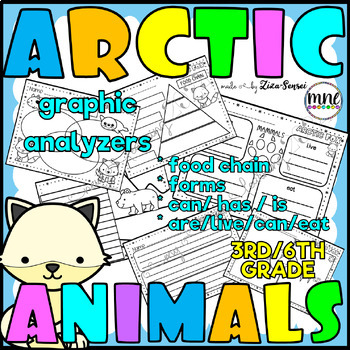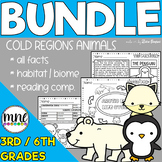Arctic Fox Unit Study And Research Biome Arctic Tundra Pack
- PDF
Also included in
- Cold Region Animals Facts Informational texts, physical features, habitat, climate, diet, food chain, graphic analyzers, forms, and writing prompts.Ideal for group, team, or individual work!This is geared towards 3rd-6th Grade, or according to your needs and teaching subject. It can be used with advPrice $11.00Original Price $15.00Save $4.00
Description
Arctic Fox informational texts, facts, physical features, habitat, climate, diet, food chain, graphic analyzers, forms, and writing prompts.
Ideal for group, team, or individual work!
This is geared towards 3rd-6th Grade, or according to your needs and teaching subject. It can be used with advanced ESL/EFL/ELL/ESOL/ENL/EL students. It can be used for Homeschool or Special Education.
There are 2 extra pages about the RED FOXES to compare and contrast.
It's in American English, but U.K/AUS English measures are in brackets. (m/cm - in/ft).
It is a 59-page PRODUCT in a PDF file! - NOT EDITABLE!
CHECK THE PREVIEW! :)
Contents:
* Arctic map - imaginary line
* Arctic quiz
* Arctic map - imaginary line
* Arctic quiz
* Arctic fox – informational text
* Arctic fox quiz
* Arctic fox reading comprehension I
* Arctic fox reading comprehension II
* Arctic fox reading comprehension III
* Arctic fox facts and data
* Arctic fox facts quiz
* Arctic fox reading & comprehension
* Arctic fox reading & comprehension I
* Arctic fox reading & comprehension II
* Arctic fox reading & comprehension II
* Arctic fox life cycle
* Research tasks are/live/can/eat
* Arctic fox facts
* The Arctic biome
* The Arctic biome/ tundra
* Research tasks - is/lives/can/eat // can/has/is
* Food chain
* Arctic fox facts - research
* Arctic fox & red fox – compare & contrast graphic
* Arctic fox & red fox – compare & contrast II
* Label an Arctic fox
* Label your own animal
* My favorite Arctic animal
* If I had an Arctic animal pet
* What I learned
* The Arctic writing tasks
* Graphic Analyzers & writing forms
********** ---------------- ********** ---------------- ********** ---------------- **********
*** TERMS OF USE ***
This is an Intellectual Property of My New Learning, made by Ziza-Sensei
You may NOT:
Ø share this file on any platform or other method
Ø resell or distribute this file
Ø claim this as yours
Ø modify it in any way
* ! It's only for personal use /classroom use ! * (single-user license only)
Please LEAVE FEEDBACK, where you EARN CREDITS towards future TpT purchases.
Thank you very much! :D
It's your FREE MONEY!
*** IF YOU LIKE THIS, HAVE A LOOK AT OTHER SIMILAR RESOURCES!
* Animal Life Cycles Mega Bundle 12 Packs
* Insects Bugs Study Unit Game Included Early Science Unit
* Natural Science Biology Mega Bundle 1st Grade - 6th Grade
* Dinosaurs Paleontology Fossils Extinction Theory Worksheets BUNDLE
Find more Fun And Engaging Activities:
* ELA Grammar Verb Definitions Doggy Actions Bone Paw Pack
* Language Arts Grammar Monster Adjectives Game Pack
* Hard Soft C G Domino And Sorting Game Activity Phonics Pack
Have fun teaching!

